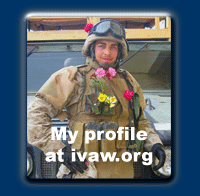Tuesday, April 15, 2008
Depressed Freeper at Petraeus Hearing Derides Adam Kokesh
Posted by Revolutionary Patriot at 6:07 PM 0 comments
New York Times Responds to Readers About WSIA Blackout
New York Times public editor Clark Hoyt:
Dear Reader,
Thank you for writing about the Winter Soldier event in Maryland last month and its lack of coverage by the Times.
My assistant checked with various editors at the Times to see if there was any discussion about covering the Winter Soldier meeting. The editor in the Washington bureau who oversees national security coverage said he had not been aware of the group or its meeting. The Times normally has three Pentagon reporters. The meeting fell within their area of coverage, and one of them probably would have been assigned had editors chosen to staff the event. But one is on book leave, one was traveling with the secretary of defense, and one was in Iraq covering the war. The Times also did not cover an announcement the following day by Vets for Freedom, a group supporting the war and claiming more than 13 times the membership of Iraq Veterans Against the War, the group which organized Winter Soldier.
One group was emphasizing what it charged were war crimes, war profiteering and war mismanagement. The other group was protesting what it charged was the failure of the media to report more fully on signs of progress in Iraq, such as rebuilt schools and infrastructure.
News organizations like the Times, with its own substantial investment in independent reporting from Iraq tend to prefer their own on-scene accounts of the war, rather than relying on charges and counter-charges at home by organizations with strongly held political viewpoints about the war.
Sincerely,
Clark Hoyt
****
The Times' D.C. bureau editor's claim to have not heard of the hearings is remarkable, given that the AP newswire carried a story on the hearings, and IVAW has confirmed to FAIR that the D.C. bureau had been sent three separate rounds of different IVAW press releases. In addition, at least 150 Times staffers were sent press releases about Winter Soldier by the Institute for Public Accuracy, a group that encourages inclusion of overlooked facts and progressive perspectives in media coverage. Given that media organizations operating on a small fraction of the Times' budget were aware of and able to find the resources to cover these hearings, the Times' D.C. bureau's plea to ignorance about the hearings is all the more disappointing.
Meanwhile, Hoyt's justification of the Times failure to cover Winter Soldier on the grounds that they also did not cover "an announcement the following day by Vets for Freedom, a group supporting the war and claiming more than 13 times the membership of Iraq Veterans Against the War, the group which organized Winter Soldier," draws a far-fetched parallel between a group presenting eyewitness testimony about atrocities in Iraq and a group releasing a press release about media bias. (As a group that often puts out press releases about media bias that don't get covered by the Times, the comparison strikes us as rather absurd.) Further, the size of IVAW and Vets for Freedom are not directly comparable, as IVAW is a group of veterans of the Iraq and Afghanistan wars, whereas anyone can sign up on the Vets for Freedom website, which stipulates that "non-veterans can also be members of Vets for Freedom."
Hoyt's claim that "news organizations like the Times, with its own substantial investment in independent reporting from Iraq, tend to prefer their own on-scene accounts of the war" is akin to asserting that reporters on the police beat prefer to write about crimes they have seen themselves rather than talking to eyewitnesses. Given that Times reporters, like all Western journalists in Iraq, have great difficulty travelling freely outside the Green Zone, it is hard to imagine that they could provide a full and accurate picture of the war without interviewing people who have participated in it. And of course the paper does often interview U.S. military personnel about what they've seen, though when they are whistleblowers trying to call attention to what they describe as "the human consequences of failed policy," the Times suddenly has much less interest in what they have to say.
The New York Times' decision to assign one of its two available correspondents to tour with the Secretary of Defense instead of hearing the first-hand accounts of the Winter Soldiers demonstrates a very strange notion of "independent reporting."
fair.org
4/8/08
Posted by Revolutionary Patriot at 3:10 PM 2 comments
















